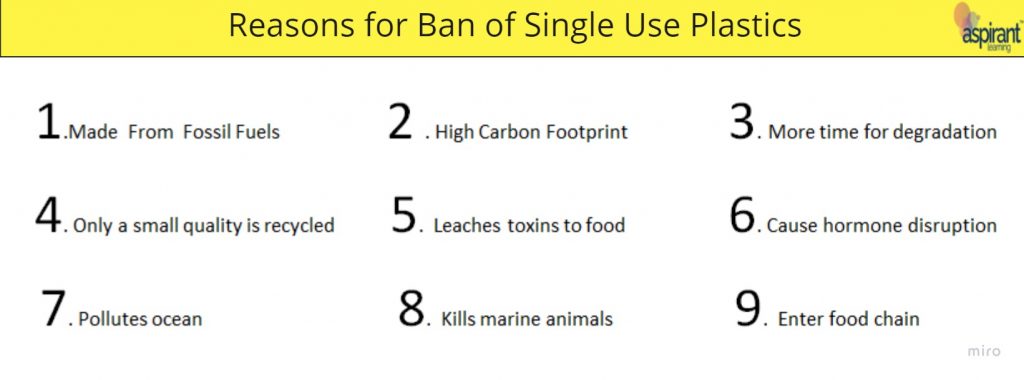News Highlights
The Centre has defined a list of single-use plastic items that will be banned from July 1.
Focus Points
- The manufacture, import, stocking, distribution, sale and use of following single-use plastic, including polystyrene and expanded polystyrene, commodities shall be prohibited with effect from the 1st July, 2022
What is Single Use Plastics?
- As the name suggests, it refers to plastic items that are used once and discarded.
- Single-use plastic has among the highest shares of plastic manufactured and used from packaging of items, to bottles , polythene bags, face masks, coffee cups, cling film, trash bags, food packaging etc.
Findings about Single Use Plastics
- As per a 2021 report of Minderoo Foundation, an Australian philanthropic organisation the single-use plastics account for a third of all plastic produced globally, with 98% manufactured from fossil fuels.
- Single-use plastic also accounts for the majority of plastic discarded – 130 million metric tonnes globally in 2019.
- On the current trajectory of production, it has been projected that single-use plastic could account for 5-10% of greenhouse gas emissions by 2050.
- India
- The report found that India features in the top 100 countries of single-use plastic waste generation – at rank 94 (the top three being Singapore, Australia and Oman).
- With domestic production of 11.8 million metric tonnes annually, and import of 2.9 MMT, India’s net generation of single-use plastic waste is 5.6 MMT, and per capita generation is 4 kg.
Items Being Banned
- Central Pollution Control Board (CPCB) have announced a ban are
- Plastic Sticks: ear buds with plastic sticks, plastic sticks for balloons, plastic flags, candy sticks, ice- cream sticks, polystyrene (Thermocol) for decoration.
- Cutlery Items: plates, cups, glasses, cutlery such as forks, spoons, knives, straw, trays
- Packing/Wrapping Films: Wrapping or packing films around sweet boxes, invitation cards, and cigarette packets.
- Other Items: Plastic or PVC banners less than 100 microns, stirrers.
- Previous Ban – The Ministry had already banned polythene bags under 75 microns in September 2021, expanding the limit from the earlier 50 microns. From December, the ban will be extended to polythene bags under 120 microns.
Reasons for Ban These Items
- The choice for the first set of single-use plastic items for the ban was based on “difficulty of collection, and therefore recycling”.
- It is mainly from cosmetics items toothpaste , shaving cream.
- The largest share of single-use plastic is that of packaging – with as much as 95% of single use belonging to this category – from toothpaste to shaving cream to frozen foods.

How Ban is Imposed
- Implementation
- The ban will be monitored by the CPCB from the Centre, and by the State Pollution Control Boards (SPCBs) that will report to the Centre regularly.
- Directions have been issued at national, state and local levels, for example, to all petrochemical industries to not supply raw materials to industries engaged in the banned items.
- Directions have also been issued to single-use plastics(SPCBs) and Pollution Control Committees to modify or revoke consent to operate issued under the Air/Water Act to industries engaged in single-use plastic items.
- Local authorities have been directed to issue fresh commercial licences with the condition that SUP items will not be sold on their premises, and existing commercial licences will be cancelled if they are found to be selling these items.
- Effect of Violation
- Those found violating the ban can be penalized under the Environment Protection Act 1986 – which allows for imprisonment up to 5 years, or a penalty up to Rs 1 lakh, or both.
Single Use Plastics in Other Countries
- Bangladesh became the first country to ban thin plastic bags in 2002.
- New Zealand became the latest country to ban plastic bags in July 2019.
- China issued a ban on plastic bags in 2020 with phased implementation.
- Eight states in the US have banned single-use plastic bags, beginning with California in 2014. Seattle became the first major US city to ban plastic straws in 2018.
Way Forward
- Single use plastics are invisible human made dangers that have multiple effects that range from diseases for humans to destruction of biodiversity.
Content Source : Indian Express



